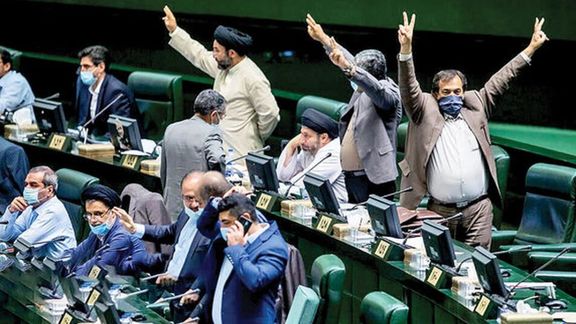Iran To Keep Politically Sensitive $8 Billion Import Subsidy

Iran's parliament on Sunday delayed a bill that would eliminate a huge government subsidy for essential goods which weighs heavily on Iran’s depleted reserves.

Iran's parliament on Sunday delayed a bill that would eliminate a huge government subsidy for essential goods which weighs heavily on Iran’s depleted reserves.
The bill proposed by President Ebrahim Raisi is an amendment to the current year's budget law to allow the government to stop allocating cheap dollars for importing basic commodities. These include cooking oil, animal feed, medicine and medical equipment.
The government has said that instead, it is planning to pay a direct monthly cash handout of 1.1 million rials (less than $4) to 60 million Iranians whose income level is considered low.
The subsidy started when the national currency began to lose value in early 2018, raising food prices. The cheap dollars were provided to importers at 42,000 rials, instead of the current free market rate of 280,000 rials to one US dollar.The government has spent an average of $8 billion a year since April 2018 to finance subsidized essential imports.
Before the parliament took vote on the urgency of the controversial bill Sunday morning, a member of the Planning and Budget Committee, Ehsan Arkani, claimed that the government had retracted its bill.
The parliament, however, voted to decide the urgency of the bill. Lawmakers voted against not only the bill’s double-urgency but also single-urgency. Double-urgency, if approved, meant the bill would have been debated and put to vote within 24 hours while single-urgency would have given the bill priority over other bills and motions on parliament's agenda. To kick back the bill means it might languish until April, after the start of the Iranian new year.
Eliminating the “cheap dollar’ subsidy would raise prices of essential goods by five to six times but would also help make up for some of the huge budget deficiency the government is grappling with and somewhat slow down inflation.
The main reason for the government's insistence on doing away with the scheme is remedying the budget deficit, conservative Alef website argued. "All other reasons offered by administrations [in the past and now] are secondary."
Alef also argued that although reforming the exchange rate for importing basic commodities is defendable, those who oppose it now are worried about when and how such a reform should be carried out to prevent undesirable consequences such as cash flow problems for importers.
Higher prices can also push down consumption of protein and dairy products, the article said, and affect production, employment, and even people's health. Payment of cash handouts, also, could backfire and push up the annual inflation rate which now stands at around 45%.
Putting the budget law amendment bill on the back burner means the government will have to resort to other measures, such as borrowing from the Central Bank, to remedy the current year's budget deficit. The Central Bank in turn has no reserves and has to print money, fueling inflation.
Meanwhile, the national currency has continued to plunge against the dollar as the country awaits the resumption of nuclear talks with world powers in Vienna on November 29. The rial fell to the lowest point in the past twelve months Saturday by crossing the 285,000 mark against the US dollar.
The official news agency IRNA's tweet 11 November about unfreezing of $3.5 billion of Iran's funds blocked in other countries has done very little to reassure the market and stop the further depreciation of the rial. An officials of the Iran-Iraq trade chambers said Sunday that Iraq has not released any funds. The head of Iran-South Korea chamber also said Saturday that South Korea has not released any of the Iranian funds frozen in that country.